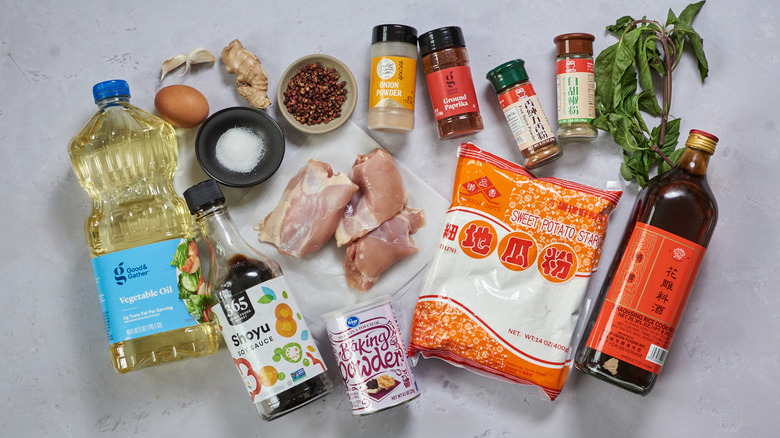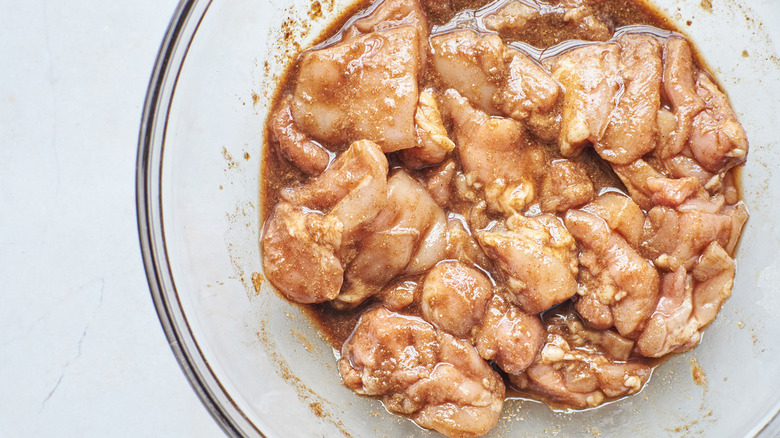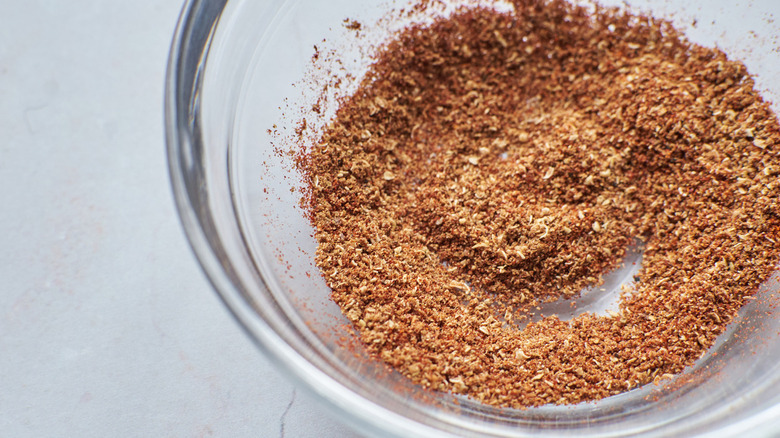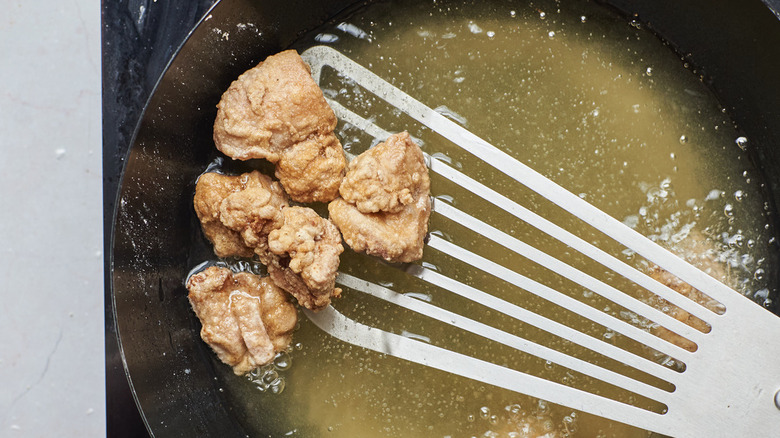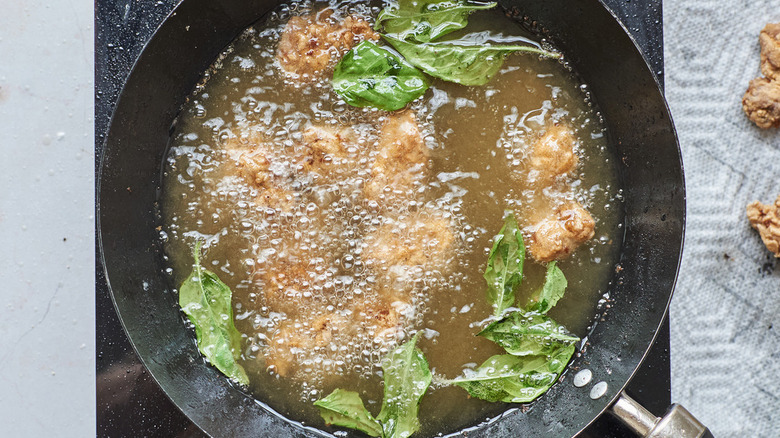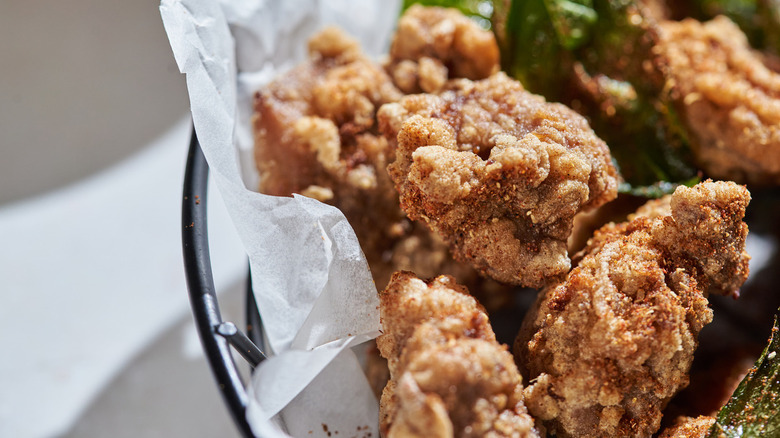Taiwanese Popcorn Chicken Recipe
Taiwan has such a famously robust street food culture that the late-night meal even has its own name. According to the BBC, the midnight snack, or in Chinese, the xiaoye, is the fourth meal of the day that is served well past sundown to anyone wandering the streets after midnight. The wanderers aren't just a few night owls, either: The city is bustling all night, with long lines of hungry people coming from local bars, clubs, and watering holes. The food is unique, a fusion of many cultures with a strong Chinese influence, and made in open air right in front of hungry, eager customers.
One of the most famous dishes at these Taiwanese night markets is popcorn chicken, which is bursting with flavor and deliciously crispy. What sets Taiwanese chicken apart from other popcorn chicken is the crunchy basil, the twice-fried exterior, and the unique flavor. In this recipe developed by Michelle McGlinn, the chicken is made with all of these factors, dredging in sweet potato starch and sprinkling with Sichuan pepper for perfectly delicious crunchy chicken. The best part? It doesn't have to be past midnight to enjoy these at home.
Grab the ingredients for Taiwanese popcorn chicken
You'll need boneless chicken, and you can use either breasts or thighs, but we recommend thighs for juicier, more tender pieces. It's important to marinate the chicken well for Taiwanese popcorn chicken, so grab Chinese five spice powder (or make your own), onion powder, white pepper, sugar, ginger, garlic, Shaoxing wine, and soy sauce. For frying you'll need an egg white, baking powder, oil, and sweet potato starch. Sweet potato starch is the key ingredient in this popcorn chicken and makes the pieces incredibly crispy while also being light and airy. It's different from potato starch and cornstarch, so swapping either of those in will change the results slightly. Of course, the chicken will get decently crispy even if you use regular flour, so if you can't find sweet potato starch, swap it for another. Before you swap, try looking at your local Asian market or Amazon for the sweet potato.
For topping, you'll need Sichuan red peppercorns, paprika, a little more white pepper, and Thai basil. It will not be the same without Sichuan peppercorns, so don't swap them, because they have a unique numbing mouthfeel that no other peppercorn can replicate. If you can't find Thai basil at the Asian markets, sweet or Genovese (the kind at most grocery stores) will work.
Marinate the chicken
You don't need a lot of time for this marinade, so long as you set the chicken aside for 15 or 20 minutes to soak up the flavors a bit. Toss the chicken, spices, and sauces in a bowl together until the chicken is well coated and let it marinate while you make the peppercorn topping and prep the dredge. If you have the time, you can marinate the chicken covered in the refrigerator for up to 8 hours.
Toast and grind the peppercorns for the topping
One of the best things about Taiwanese popcorn chicken is the dusting of peppercorns that is sprinkled on top, which is done because the flavor is most prominent when added last. This is a good technique to use anytime you want your fried food to have a specific flavor at the forefront.
To make the topping, toast and grind the peppercorns. Don't try to skip toasting the peppercorns, or they may taste bitter and citrusy rather than hot and woody. Just throw them in a hot skillet for a minute, then either grind them by hand in a mortar or blitz them in a spice grinder until very fine. Mix the ground peppercorns with paprika and white pepper and set it aside.
Dredge and fry the chicken
Mix the egg white into the chicken, then prepare a bowl with the potato starch and baking powder. Heat the oil until hot — if you stick a wooden chopstick into the oil and rest it on the bottom of the pot, tiny bubbles will rapidly form around the tip. If no bubbles form, keep heating.
Once the oil is already hot, start dredging the chicken. Don't work ahead here, or the starch will get soggy on the chicken and won't fry the same. Toss the chicken in the starch, shake it a bit, then immediately drop it into the oil (carefully, avoid splashing). These little bites fry up fast, so after a minute or so they'll be floating and ready to remove.
Fry the chicken again
Double-frying is a technique necessary in Taiwanese popcorn chicken to achieve a perfectly crispy, crunchy bite. Some fried chicken recipes do this, utilizing the batter for dredging twice for extra crisp, but for popcorn chicken there's no need to dredge again. Just heat the oil back to hot (it cools down a bit when adding all the cold chicken) and pop the chicken back into the oil. Because the starch won't fall off as easily this time, you can work in larger batches.
While you're double frying, toss in the basil leaves. Don't skip this — the crunchy basil is a uniquely savory-sweet flavor that compliments the chicken perfectly. The basil takes on some of that chicken flavoring, making it almost potato-chip like with a hint of sweet. Drain everything on paper towels after removing from the oil.
Sprinkle with Sichuan and serve
Grab the Sichuan powder you prepared and sprinkle it on the warm chicken. The powder will adhere to the chicken best directly after frying, so try to do this right away. Once you dust the chicken, let them cool slightly, then dig in. These are delicious dunked in sriracha aioli or teriyaki sauce and served alongside other late-night foods like soup dumplings, bao, and scallion pancakes. These aren't the best next-day food, since like most fried foods, they get a little soggy and sad in the refrigerator. That doesn't mean they can't be saved, though: You can microwave them, bake them for a few minutes, or air fry them back to crispy. The best idea? Save a few in the refrigerator or freezer to reheat after a night out, and enjoy them the real way — late at night and hungry.
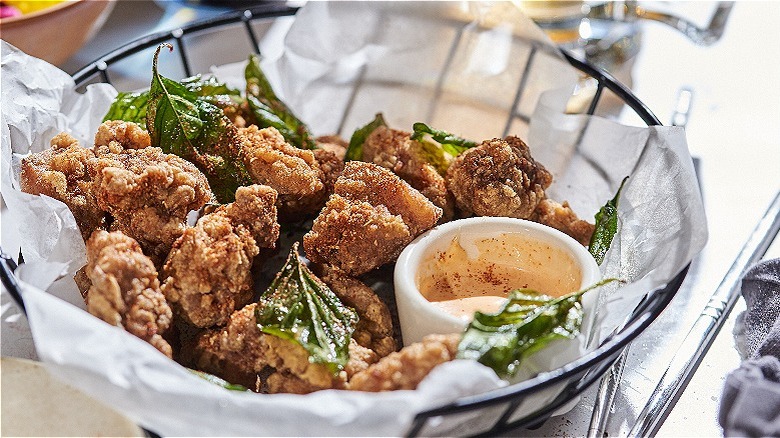
- 10 ounces boneless, skinless chicken thighs, cubed
- 1 teaspoon Chinese five spice powder
- ½ teaspoon onion powder
- 2 teaspoons white pepper, divided
- 1 teaspoon white sugar
- 1 large clove garlic, grated
- 1 inch ginger, peeled and grated
- 1 ½ tablespoons Shaoxing wine
- 1 ½ tablespoons soy sauce
- 2 tablespoons whole Sichuan peppercorns
- 1 teaspoon paprika
- 1 cup sweet potato starch
- 1 tablespoon baking powder
- vegetable oil, for frying
- 1 egg white
- 10 Thai basil leaves, patted dry
- In a small bowl, combine the chicken with the five spice, onion powder, 1 teaspoon of white pepper, sugar, grated garlic, grated ginger, Shaoxing wine, and soy sauce. Set aside to marinate while preparing the dredge and seasoning.
- Toast the peppercorns in a dry skillet until fragrant, about 2 minutes. Remove from the skillet and grind in a mortar and pestle or spice grinder until very finely ground.
- Combine the ground Sichuan peppercorns with the paprika and remaining teaspoon white pepper. Set aside.
- To prepare the dredge, combine the sweet potato starch and baking powder in a large, shallow bowl.
- Heat 2 inches of oil in a wok or deep skillet until 350 F, or until a drop of starch sizzles immediately.
- Mix the egg white into the chicken. Working with 1 to 4 pieces at a time, dredge in the starch mixture until completely coated, then shake off any excess. Add to the oil immediately and fry until golden and floating to the top, about 2-3 minutes. Remove with a slotted spoon or spatula and repeat with the remaining chicken.
- Turn the heat up so that the oil is hot and return the fried chicken pieces to the wok, working in batches of 6 to 10. Drop in a few leaves of Thai basil. Fry until golden brown and crispy, another 2-3 minutes, then remove and drain on a paper-towel lined baking sheet, removing the Thai basil with it. Repeat until all chicken pieces are double-fried.
- To serve, sprinkle the prepared Sichuan seasoning over warm chicken. Serve with crispy Thai basil.
| Calories per Serving | 857 |
| Total Fat | 47.9 g |
| Saturated Fat | 4.4 g |
| Trans Fat | 0.3 g |
| Cholesterol | 133.2 mg |
| Total Carbohydrates | 73.2 g |
| Dietary Fiber | 4.0 g |
| Total Sugars | 2.7 g |
| Sodium | 1,371.6 mg |
| Protein | 32.1 g |

